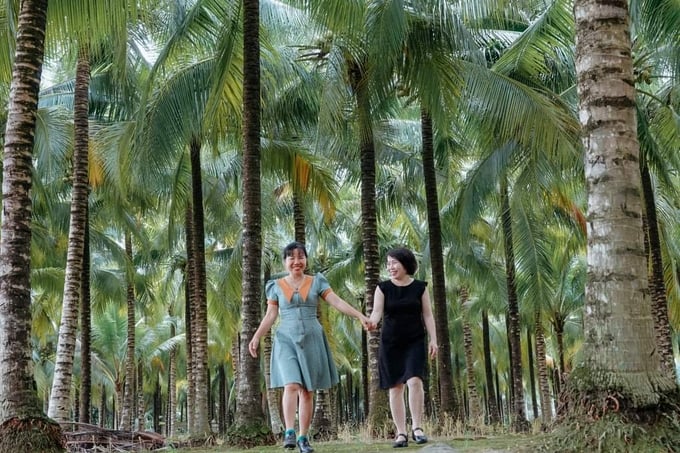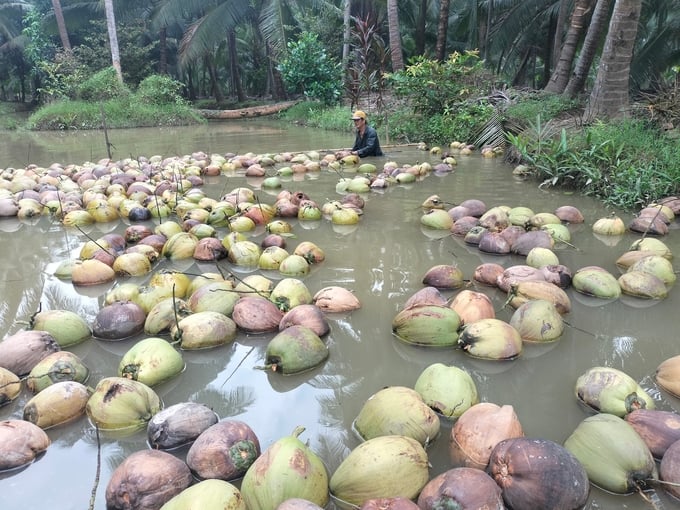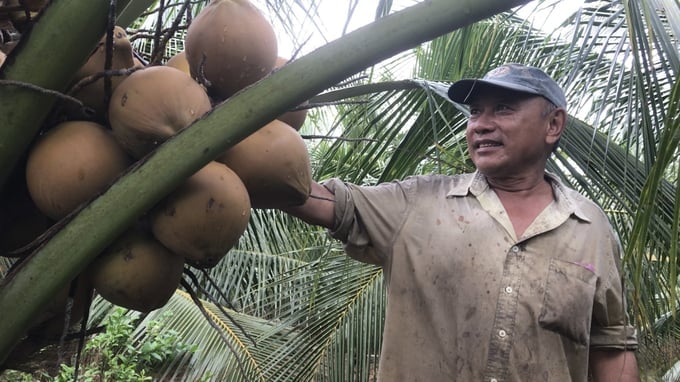November 25, 2025 | 00:07 GMT +7
November 25, 2025 | 00:07 GMT +7
Hotline: 0913.378.918
November 25, 2025 | 00:07 GMT +7
Hotline: 0913.378.918
On April 11, Vice Chairman of Ben Tre Provincial People's Committee Nguyen Minh Canh announced that the local Department of Natural Resources and Environment has been assigned to coordinate with relevant departments, sectors, and local governments in implementing the task of "Assessing Ben Tre province's potential for participation in the carbon credit market." The task will be allocated an estimated budget of approximately 4.5 billion Vietnamese dong from the environmental protection fund for the years between 2024 and 2026, on an annual allocation basis.

Ben Tre province currently houses approximately 79,000 hectares of coconut production areas. Photo: Minh Dam.
Accordingly, Ben Tre province's Department of Natural Resources and Environment will collaborate with relevant sectors to assess the carbon potential within the province's territory. Subsequently, stakeholders will determine the province's carbon credit potentials, and prepare for Ben Tre's participation in the carbon credit market, as per the roadmap outlined in the Law on Environmental Protection dated November 17, 2020.
The Department of Natural Resources and Environment will undertake several key tasks from 2024 to 2026, including: evaluating and determining the potential for reducing greenhouse gas emissions in agriculture, forestry, transportation, construction, energy, and waste sectors; researching and developing carbon credits for Ben Tre province with a focus on coconut trees, coastal mangrove forests, renewable energy, and livestock production; enhancing the capacity of local management agencies and emission sources to participate in the carbon market.
This task is aimed at implementing Decision No. 888/QD-TTg issued by the Prime Minister on July 25, 2022, which approved the Project for tasks and solutions to implement the results of the 26th United Nations Climate Change conference.
Carbon credits are certificates for commercial transactions, and represent the right to emit carbon dioxide, a greenhouse gas. One carbon credit is equivalent to 1 ton of carbon dioxide. With regards to the current trend of sustainable development and carbon emission reduction, the carbon credit market is rapidly growing as an attractive opportunity for the agricultural sector as a whole, and for the coconut production industry in Ben Tre province.

Organic coconut harvesting in Binh Dai district, Ben Tre province. Photo: Minh Dam.
Ben Tre province currently houses approximately 79,000 hectares of coconut production areas, 25,000 hectares of production areas, and 7,000 hectares of mangrove forests. These areas hold significant potential as a carbon credit supply source.
A distinctive feature of the biomass in Ben Tre province is its year-round vegetation cover and a noticeable lack of leaf shedding seasons, which contribute to its high carbon sequestration efficiency. According to estimates, one hectare of coconut production area in Ben Tre can sequester between 25 and 75 tons of carbon dioxide. With the current minimum carbon credit price at 5 US dollars per ton of carbon dioxide, Ben Tre province can potentially earn between 10 to 30 million US dollars from coconut production.
According to Associate Professor Le Anh Tuan, former Deputy Director of the Research Institute for Climate Change - Can Tho University, Ben Tre province must conduct in-depth research into the carbon storage capacity of fruit production areas across the province with the aim of developing carbon credits, and promoting the commercialization of these credits as an economic benefit.

Ben Tre province's Department of Agriculture and Rural Development requires time to conduct further research into the province's carbon credit potentials, and calculate profit-sharing models for local residents. Photo: Minh Dam.
However, Ben Tre province's Department of Agriculture and Rural Development requires time to conduct further research into the province's carbon credit potentials, and calculate profit-sharing models for local residents.
According to the Ben Tre Provincial People's Committee's action plan on sustainable development in Ben Tre province from 2021 to 2030, the local Department of Agriculture and Rural Development will develop eco-friendly agriculture, as well as promote carbon emission recycling and climate change resilience.
On the other hand, Ben Tre aims to protect, conserve, sustainably utilize and develop existing forest areas to reduce emissions; while simultaneously engage in afforestation to enhance carbon quality and storage. Futhermore, Ben Tre will proactively collaborate with experts to research into the potential value of the carbon credit market for the agricultural sector, with a focus on coconut trees and other perennial crops.
Ben Tre province will focus on implementing technical support solutions and policies to promote the development of the coconut industry, and maintain its position as the country's leading industrial crop. The province also plans to expand and establish additional concentrated fruit production areas in association with production unit codes to maintain biomass and enhance export competitiveness, thereby participating in the global trend of low-carbon emissions. Moreover, Ben Tre is determined to assist Vietnam in fulfilling the commitment to achieve net-zero emissions by 2050. To that end, the province will mobilize resources, innovate technologically, and restructure its agricultural sector.
Translated by Nguyen Hai Long

(VAN) Green transition is crucial for the Mekong Delta amid climate change and stricter standards, offering a path toward sustainability.

(VAN) Dong Thap promotes agricultural restructuring, forms large specialized farming zones, raises the value of agricultural products and develops toward ecological and high-tech directions.
/2025/11/22/4018-4-213342_747.jpg)
(VAN) The Mekong Delta Agricultural Experts Club has attracted 143 experts and researchers to participate in providing consultancy and contributing initiatives to the development of one million hectares of high-quality rice.

(VAN) Ca Mau’s development of OCOP products opens a path to increasing cooperatives value, helping boost income, expand markets, and affirm collective economy's role.

(VAN) Turning seemingly ordinary coconut shells into unique jewelry and artwork, Nguyen Bang Nhi spreads the value of local culture through her brand, Cocohand.

(VAN) Results from the Sustainable Durian Model Project in Dak Lak have confirmed the critical role of Yara Viet Nam in transferring advanced nutritional solutions to farmers.

(VAN) In Tuyen Quang province, livestock farmers have introduced effective models and innovative practices that significantly strengthen African Swine Fever prevention and control efforts.